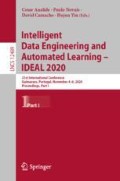Abstract
In the context of predicting continuous variables, many proposals in the literature exist dealing with point predictions. However, these predictions have inherent errors which should be quantified. Prediction intervals (PI) are a great alternative to point predictions, as they permit measuring the uncertainty of the prediction. In this paper, we review Quantile Regression Forests and propose five new alternatives based on them, as well as on classical random forests and linear and quantile regression, for the computation of PIs. Moreover, we perform several numerical experiments to evaluate the performance of the reviewed and proposed methods and extract some guidelines on the method to choose depending on the size of the data set and the shape of the target variable.
Access this chapter
Tax calculation will be finalised at checkout
Purchases are for personal use only
References
Kaggle (2017). https://www.kaggle.com/. Accessed Mar 2020
Bogner, K., Pappenberger, F., Zappa, M.: Machine learning techniques for predicting the energy consumption/production and its uncertainties driven by meteorological observations and forecasts. Sustainability 11(12), 1–22 (2019)
Breiman, L.: Random forests. Mach. Learn. 45, 5–32 (2001)
Dua, D., Graff, C.: UCI Machine Learning Repository (2017). http://archive.ics.uci.edu/ml. Accessed Mar 2020
Hastie, T., Tibshirani, R., Friedman, J.: The Elements of Statistical Learning, 2nd edn. Springer, Heidelberg (2009)
Jiang, J., Zhang, W.: Distribution-free prediction intervals in mixed linear models. Stat. Sin. 12, 537–553 (2002)
Koenker, R.: Quantile Regression. Econometric Society Monographs. Cambridge University Press (2005). https://doi.org/10.1017/CBO9780511754098
Meinshausen, N.: Quantile regression forests. J. Mach. Learn. Res. 7, 983–999 (2006)
Meinshausen, N., Michel, L.: quantregForest: Quantile Regression Forests (2017). https://CRAN.R-project.org/package=quantregForest, R package version 1.3-7
Pearce, T., Brintrup, A., Zaki, M., Neely, A.: High-quality prediction intervals for deep learning: a distribution-free, ensembled approach. In: Proceedings of Machine Learning Research, Stockholm, Sweden, vol. 80, pp. 4075–4084 (2018)
Shrestha, D.L., Solomatine, D.P.: Machine learning approaches for estimation of prediction interval for the model output. Neural Netw. 19(2), 225–235 (2006)
Wooldridge, J.M.: Introductory Econometrics: A Modern Approach, 5th edn. South-Western CENGAGE Learning (2013)
Yuan, S.: Random gradient boosting for predicting conditional quantiles. J. Stat. Comput. Simul. 85(18), 3716–3726 (2015)
Zheng, S.: QBoost: predicting quantiles with boosting for regression and binary classification. Expert Syst. Appl. 39(2), 1687–1697 (2012)
Author information
Authors and Affiliations
Corresponding author
Editor information
Editors and Affiliations
Rights and permissions
Copyright information
© 2020 Springer Nature Switzerland AG
About this paper
Cite this paper
Calviño, A. (2020). On Random-Forest-Based Prediction Intervals. In: Analide, C., Novais, P., Camacho, D., Yin, H. (eds) Intelligent Data Engineering and Automated Learning – IDEAL 2020. IDEAL 2020. Lecture Notes in Computer Science(), vol 12489. Springer, Cham. https://doi.org/10.1007/978-3-030-62362-3_16
Download citation
DOI: https://doi.org/10.1007/978-3-030-62362-3_16
Published:
Publisher Name: Springer, Cham
Print ISBN: 978-3-030-62361-6
Online ISBN: 978-3-030-62362-3
eBook Packages: Computer ScienceComputer Science (R0)

